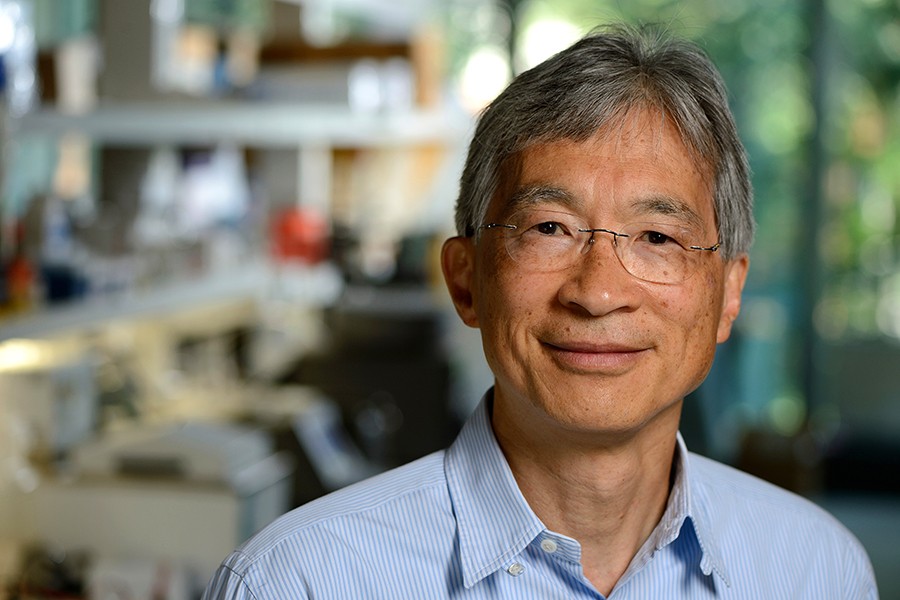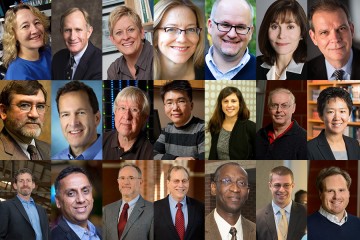Carl Wu, a widely recognized expert on chromatin biology and biochemistry, has joined Johns Hopkins University as a Bloomberg Distinguished Professor.
Wu, a member of both the National Academy of Sciences and the National Academy of Medicine, intends to set up a one-of-a-kind laboratory at Johns Hopkins dedicated to the understanding of chromatin structure and gene expression—the areas that have commanded his focus since the start of his career. Wu's research on these subjects over the years have helped elevate chromatin regulation to one of the most prominent areas of molecular biology, with broad implications in physiology and medicine.
Chromatin, the complex combination of DNA and proteins that forms chromosomes within the nucleus of eukaryotic cells, not only plays a key role in controlling genome activities throughout life but is also causally linked in gene misregulation in many diseases, including cancer.
"Both faculty and students at Hopkins stand to benefit from the expert knowledge and cutting-edge research of Dr. Wu," says JHU Provost Robert C. Lieberman. "He is exactly the type of esteemed scientist who exemplifies the goals of our Bloomberg Distinguished Professorships."
Wu joins Hopkins as the 23rd Bloomberg Distinguished Professor, a cohort of scholars working both individually and collaboratively across fields to address major world problems and teach the next generation. The professorships are supported by a $350 million gift to the university by Johns Hopkins alumnus, philanthropist, and three-term New York City Mayor Michael R. Bloomberg. The majority of this gift is dedicated to creating 50 new interdisciplinary professorships by 2018.
Most recently, Wu has served as a senior fellow at Howard Hughes Medical Institute's pioneering Janelia Research Campus in Ashburn, Virginia. There, he has headed a lab using biochemical and optical approaches—including state-of-the-art microscopy—to study the structure and function of chromatin.
Wu says that despite spending most of his career in institutions fully devoted to post-graduate biomedical research, he has "long aspired to work at a great research university." The Bloomberg professorship, he says, "enables the merger of my two complementary streams of research in biochemistry and live cell imaging into one unified effort. It is also an unparalleled opportunity to re-enter academic life and transmit the distillation of my laboratory experience to new generations of young researchers."
Wu says his lab at Hopkins will "unite classical biochemistry with contemporary genomics, proteomics, and in vivo and in vitro imaging of single biomolecules to characterize the molecular behaviors of chromatin machineries," with the end goal of learning more about the "complex systems of chromatin dysfunction in cancer and other human diseases, highlighting key enzymatic pathways for potential pharmaceutical intervention."
His appointment bridges the Department of Biology in JHU's Krieger School of Arts and Sciences and the Department of Molecular Biology and Genetics in the School of Medicine.
"Carl Wu has been a recognized leader in discovering the important contributions of epigenetics on gene regulation, by combining biochemistry, cell biology, and molecular biology with cutting-edge imaging techniques," says Beverly Wendland, dean of the Krieger School. "We are honored to have Dr. Wu on our faculty, where he will join an already strong community of scientists studying epigenetic mechanisms, and make it even stronger. We also look forward to the innovative courses he will offer our students."
Added Paul B. Rothman, dean of the medical faculty: "With Dr. Wu, we welcome the expertise and insight of a world-renowned leader in chromatin biology whose research holds great translational potential for understanding a wide array of diseases. His appointment opens up exciting new opportunities for research and collaboration at Hopkins."
Wu grew up in Hong Kong, winning a scholarship to attend Saint Mary's College in California before earning his doctorate in biology from Harvard.
In 1982, he joined the National Cancer Institute within the National Institutes of Health, where he began investigating the biochemical mechanism of chromatin remodeling. His group's discovery in the mid-1990s of an enzymatic activity necessary for creating accessible DNA sites on chromatin was recognized by the journal Nature as one of the biggest milestones in the field of gene expression over the past 50 years. Wu ultimately became chief of the Laboratory for Molecular Cell Biology at the cancer institute; then chief of the Laboratory of Biochemistry and Molecular Biology.
In addition to being elected to the National Academy of Sciences in 2006 and National Academy of Medicine in 2010, Wu is also a member of the American Academy of Arts and Sciences, the European Molecular Biology Organization, and the Academia Sinica, among other honors.
Posted in Science+Technology, University News
Tagged genetics, biology, epigenetics, biochemistry, bloomberg distinguished professorships, carl wu









